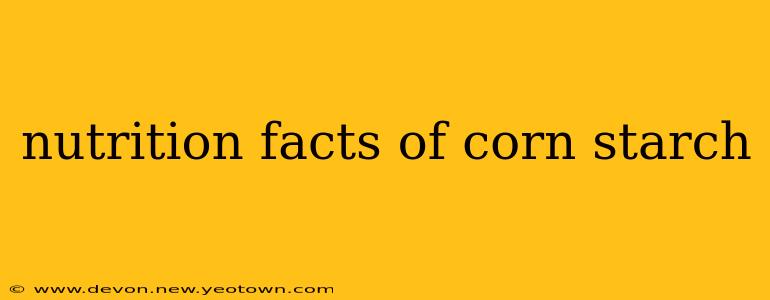Cornstarch, that ubiquitous kitchen staple, often takes a backseat in our nutritional considerations. We sprinkle it into sauces to thicken, use it as a dusting agent for frying, or even as a key ingredient in some baked goods. But what exactly is cornstarch, and what does it offer (or not offer) in terms of nutrition? Let's delve into the fascinating, if somewhat underwhelming, world of cornstarch nutrition facts.
What is Cornstarch?
Before diving into the numbers, it's crucial to understand what cornstarch actually is. It's a fine white powder derived from the endosperm of corn kernels. This process strips away most of the nutrients found in the whole corn kernel, leaving behind primarily starch. Think of it as the concentrated energy source of the corn plant, devoid of most vitamins, minerals, and fiber. This simple fact is key to understanding its nutritional profile.
Cornstarch Nutrition Facts: The Breakdown
Let's get to the heart of the matter. A typical 1 tablespoon (about 10g) serving of cornstarch contains approximately:
- Calories: Roughly 40-45 calories (mostly from carbohydrates)
- Carbohydrates: Around 10 grams (almost entirely starch)
- Protein: Negligible (less than 1 gram)
- Fat: Negligible (less than 1 gram)
- Fiber: Virtually none
As you can see, cornstarch is overwhelmingly comprised of carbohydrates, specifically starch. This is its defining characteristic and the reason it's so effective as a thickening agent. The lack of other macronutrients – protein and fat – is significant and contributes to its limited nutritional value. The absence of fiber is also notable, as fiber plays a crucial role in digestive health.
Does Cornstarch Have Any Vitamins or Minerals?
No, cornstarch is essentially devoid of vitamins and minerals. The refining process that isolates the starch removes almost all the micronutrients present in the original corn kernel. So, don't expect any significant contribution to your daily intake of vitamins A, C, or any of the B vitamins, iron, or other essential minerals.
Is Cornstarch Gluten-Free?
Yes, cornstarch is naturally gluten-free, making it a suitable ingredient for individuals with celiac disease or gluten sensitivity. However, always check the product label to ensure no cross-contamination has occurred during processing or packaging.
What are the Benefits and Drawbacks of Cornstarch?
The primary benefit of cornstarch lies in its thickening and binding properties in cooking. Its neutral flavor makes it a versatile ingredient in a wide array of recipes.
However, its nutritional shortcomings are a significant drawback. Because it lacks fiber and other essential nutrients, relying heavily on cornstarch in your diet can lead to imbalances. It's best used sparingly, as a functional ingredient rather than a significant contributor to your daily nutritional intake.
Is Cornstarch Healthy?
The question of whether cornstarch is "healthy" is complex. In moderation, as an occasional ingredient in recipes, it's unlikely to pose significant health risks. However, it's not a nutritious food and shouldn't be considered a major part of a balanced diet. Prioritizing whole grains, fruits, vegetables, and other nutrient-rich foods is essential for optimal health.
This information should not be considered medical advice. Always consult with a healthcare professional or registered dietitian for personalized dietary guidance.

